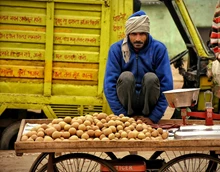
The Agriculture Ministry announced that an area of 14,491 hectares (ha) in Andaman and Nicobar has been certified as organic, making it the first significant contiguous territory to be certified under a government scheme. Following the Andaman and Nicobar Islands, Lakshadweep and Ladakh are taking constructive measures to convert their standard organic areas to certified organic, according to the study.
Traditional areas in Himachal Pradesh, Uttarakhand, north-eastern states, tribal belts of Jharkhand and Chhattisgarh, and Rajasthan's desert districts can all be converted to certified organic, according to the study. The organic certification was granted under the PGS-India (Participatory Guarantee System) certification program's Large Area Certification (LAC) Scheme.
Each village in the region is called a cluster/group under LAC. All farmers with farmland and livestock must conform to the minimum specifications and are licensed en masse after being tested, eliminating the need for a conversion time. Certification is renewed on an annual basis by verification by a peer assessment process, as per the PGS-India process.
The ministry said in a statement that it is working to find conventional organic areas that can be converted into accredited production centers. "The Government of India has certified 14,491 ha of such land in the A&N Islands' Car Nicobar and Nancowry group of islands," it added.
According to the statement, an expert committee confirmed their organic status and recommended that the region be declared certified organic under the PGS-India certification scheme, making it the first major contiguous territory to receive organic certification.
Car Nicobar and the Nancowry chain of islands, according to the ministry, have been organic for centuries. The administration has also made it illegal to sell, buy, or use any chemical inputs from genetically modified crops on these islands.
The Union Territory government, in cooperation with local governments, created an island-by-island and farmer-by-farmer inventory of land holdings, activities used, and input use history, among other things.
"With little effort, certain conventional/default organic areas can be taken under organic certification almost immediately," the ministry said, adding that there are still traditional organic areas in India's hills, tribal districts, desert, and rained areas that remain free of chemical input use.
According to the ministry, it is collaborating with states to define certain regions, convert them to organic certification, and promote the promotion of area-specific niche goods through branding and labeling. In addition, the ministry has introduced an organic certification support scheme under PKVY to put isolated individual farmers into the certified organic fold (Paramparagat Krishi Vikas Yojana).
Individual farmers may use the scheme to get financial help for certification through the NPOP (National Program for Organic Production) or PGS-India certification schemes. According to the ministry, assistance will be given in the form of reimbursement of qualification costs to certification organizations directly through the states.












